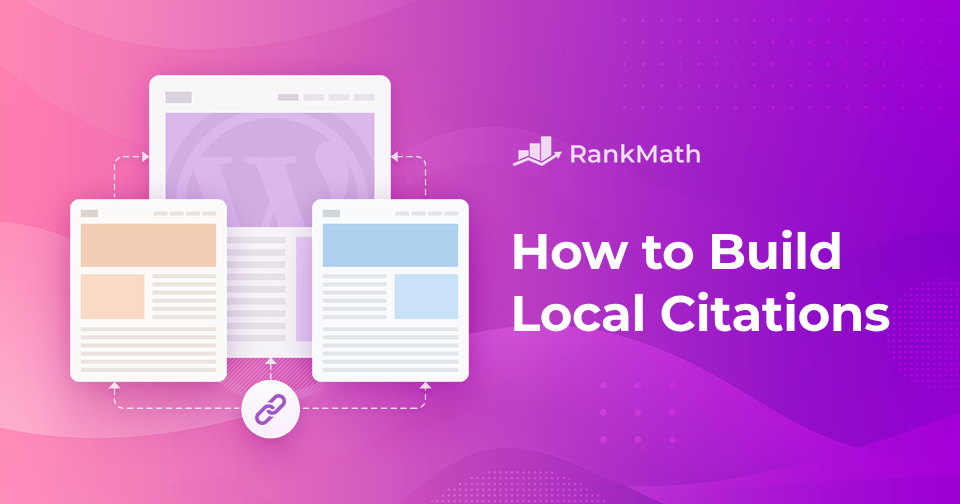Have you ever searched for a nearby service—like a plumber, cafe, or dentist—and noticed certain businesses always show up at the top?
That visibility isn’t just luck. More often than not, it’s the result of strong local citations.
Local citations are mentions of your business’s name, address, and phone number (NAP) across various online platforms. And they matter—a lot. When done right, they help search engines trust your business and rank you higher in local results.
In this post, we’ll discuss what local citations are, why they matter for your business, and how you can build them effectively to improve your online visibility.

So, without any further ado, let’s get started.
Table Of Contents
1 What Are Local Citations?
Local citations are online mentions of your business’s name, address, and phone number—often referred to as NAP. These citations play a key role in local SEO by helping your business appear in local search results.
You’ll typically find them on platforms like Google Business Profile, Yelp, and Yellow Pages. But they can also show up on social media profiles, industry-specific websites, and even local news or community blogs. Each listing helps search engines confirm that your business is real, reliable, and located where you say it is.
For example, let’s say you run a neighborhood coffee shop. If your business name, address, and phone number are consistently listed on Google, Yelp, and Yellow Pages, search engines take that as a sign of trust, and you’re more likely to show up when someone nearby searches for “coffee shop near me.”
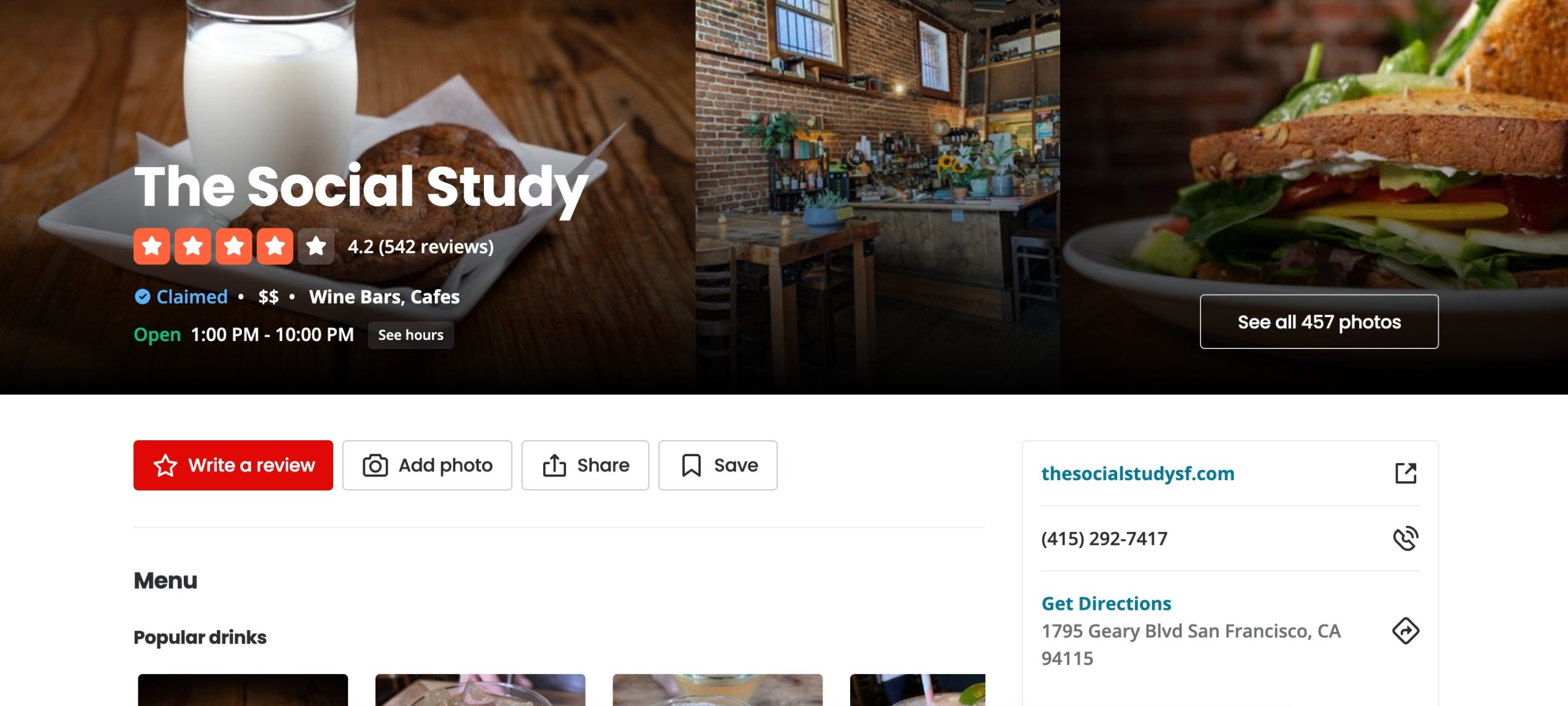
When your citations are accurate and consistent across all platforms, it not only builds trust with Google, but also gives potential customers the confidence to choose you over someone else.
2 Importance of Local Citations
Local citations play an important role in boosting your local SEO and strengthening your business’s online presence.
First, they help search engines confirm your business’s legitimacy and location. When your name, address, and phone number (NAP) appear consistently across trusted websites and directories, search engines are more likely to rank your business higher in local search results.
Second, citations increase your visibility. The more places your business is listed, the more likely it is that potential customers will find you when they search for products or services in your area.
Consistent citations also build trust. When customers see your business mentioned across well-known sites, it reinforces your credibility and reliability, making them more likely to choose you over competitors.
Finally, stronger visibility and trust lead to action. Whether it’s more website visits, phone calls, or walk-ins, accurate local citations can directly drive more engagement, resulting in higher conversions and increased revenue.
3 Types of Local Citations
Local citations come in two main types: structured and unstructured.
3.1 Structured Citations
Structured citations are listings of your business that appear in a standardized format, usually on business directories, review sites, and social media platforms.
These citations typically include important details like your business name, address, phone number (NAP), website URL, business hours, and category. Because everything is clearly labeled and organized, it’s easy for search engines to read, understand, and verify your business information.
You’ll find structured citations on platforms like Google Business Profile, Yelp, Facebook, and Yellow Pages.
For example, if you’ve set up your Google Business Profile, it will display your NAP, operating hours, and customer reviews in a consistent format that search engines can easily crawl and index.
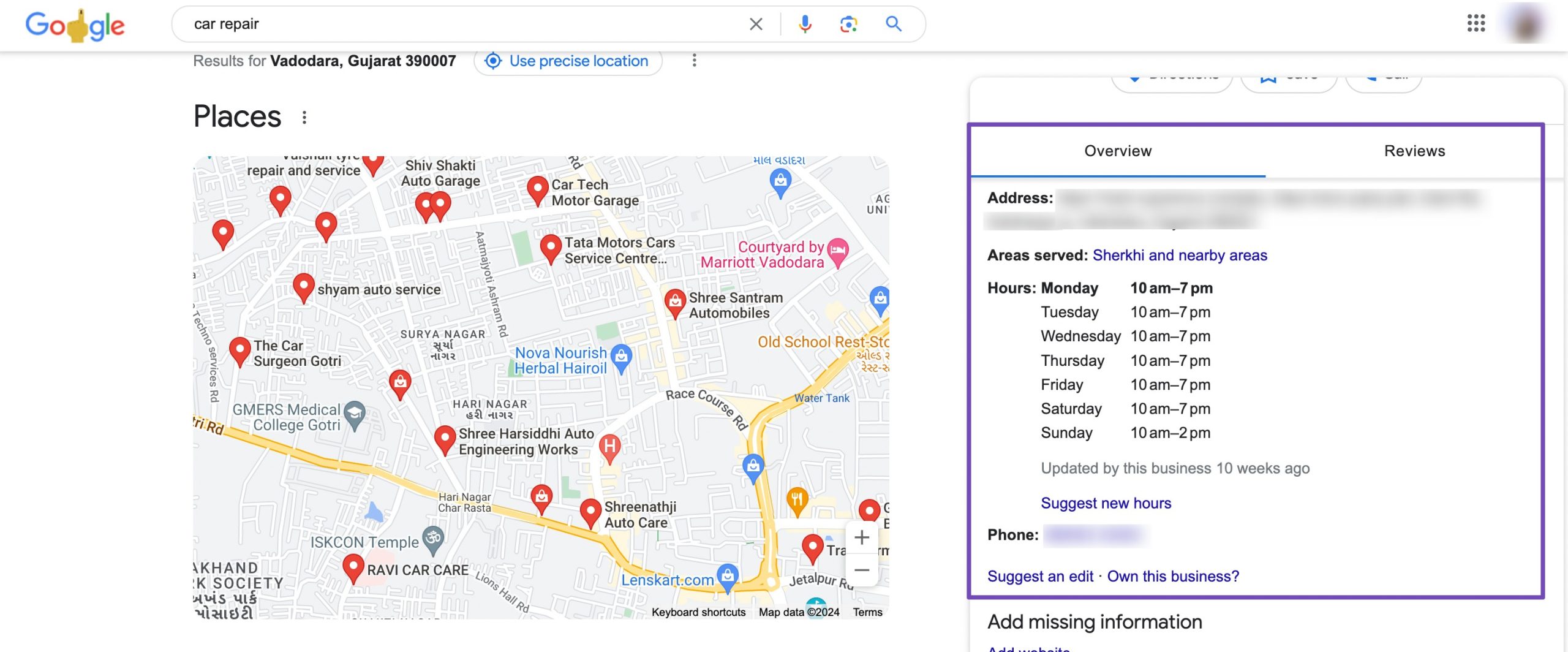
3.2 Unstructured Citations
Unstructured citations are informal mentions of your business that show up outside of traditional directories, and they don’t follow a fixed format like structured citations do.
You’ll typically find these in places like blog posts, news articles, social media updates, or any type of content where your business name, address, or phone number (NAP) is mentioned naturally.
For example, a local tourism blog might feature your shop in a list of must-visit spots, or a food blogger could write a review of your café and casually include your contact details in the post.
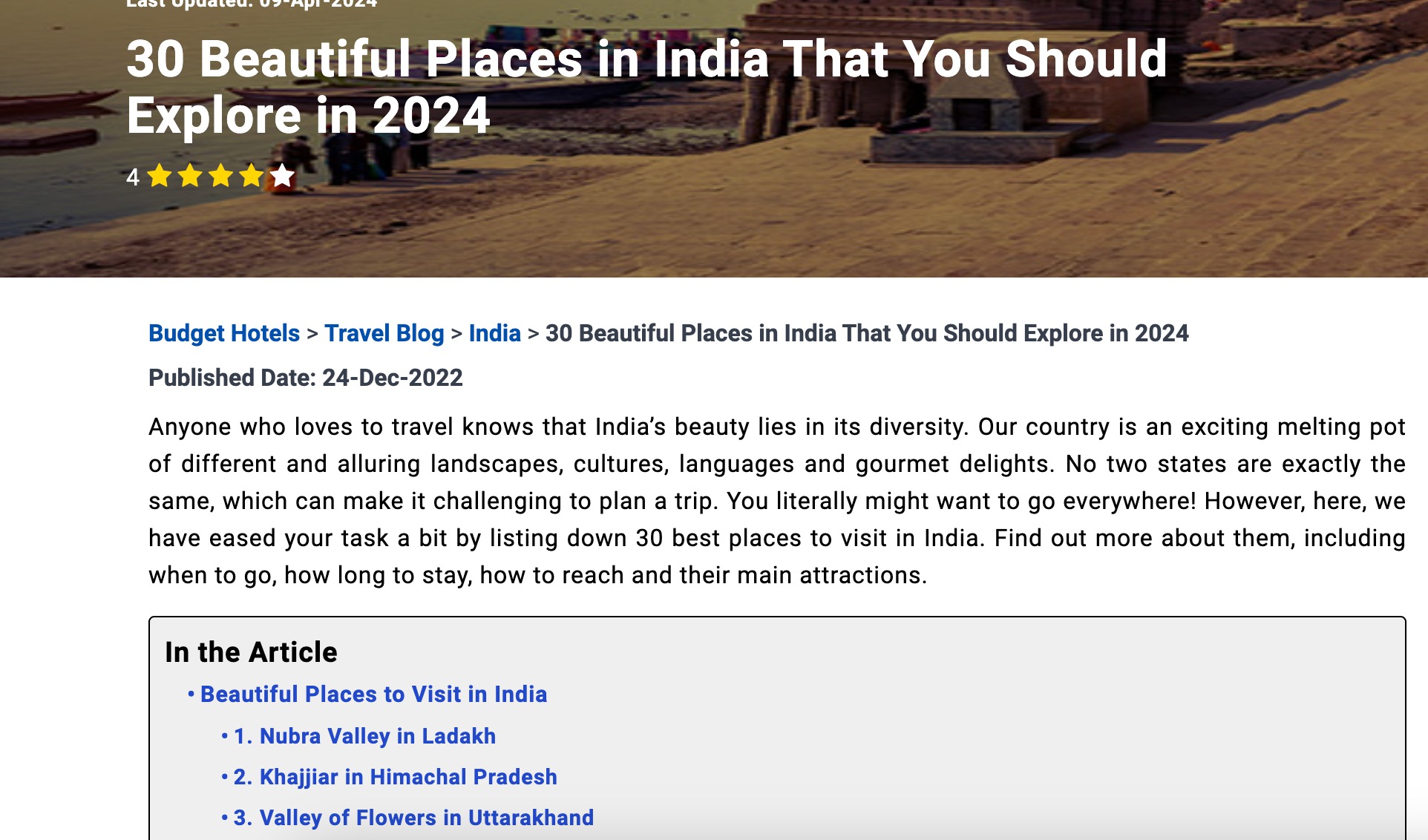
Even though these mentions aren’t neatly formatted, they still carry weight. Unstructured citations help:
- Boost your online visibility
- Strengthen your brand across different platforms
- Build credibility and trust with people who discover you through organic content
When combined with structured citations, these natural mentions give your local SEO a strong foundation, offering both technical SEO value and organic brand exposure.
4 How to Build Local Citations
Now that you understand the value of local citations, let’s look at how to build them, starting with one of the most efficient methods: using Google Business Profile.
4.1 Google Business Profile
If you want your business to show up on Google, especially in the local pack or on Google Maps, your Google Business Profile needs to be complete and regularly updated.
If you’re not sure whether you’ve already set one up, here’s a quick way to check:
- Navigate to Google Maps and search for your business name.
- If your business appears and you see a button that says Claim this business, it means your profile hasn’t been claimed yet.
- Simply click on that button and follow the steps to claim and set up your profile.
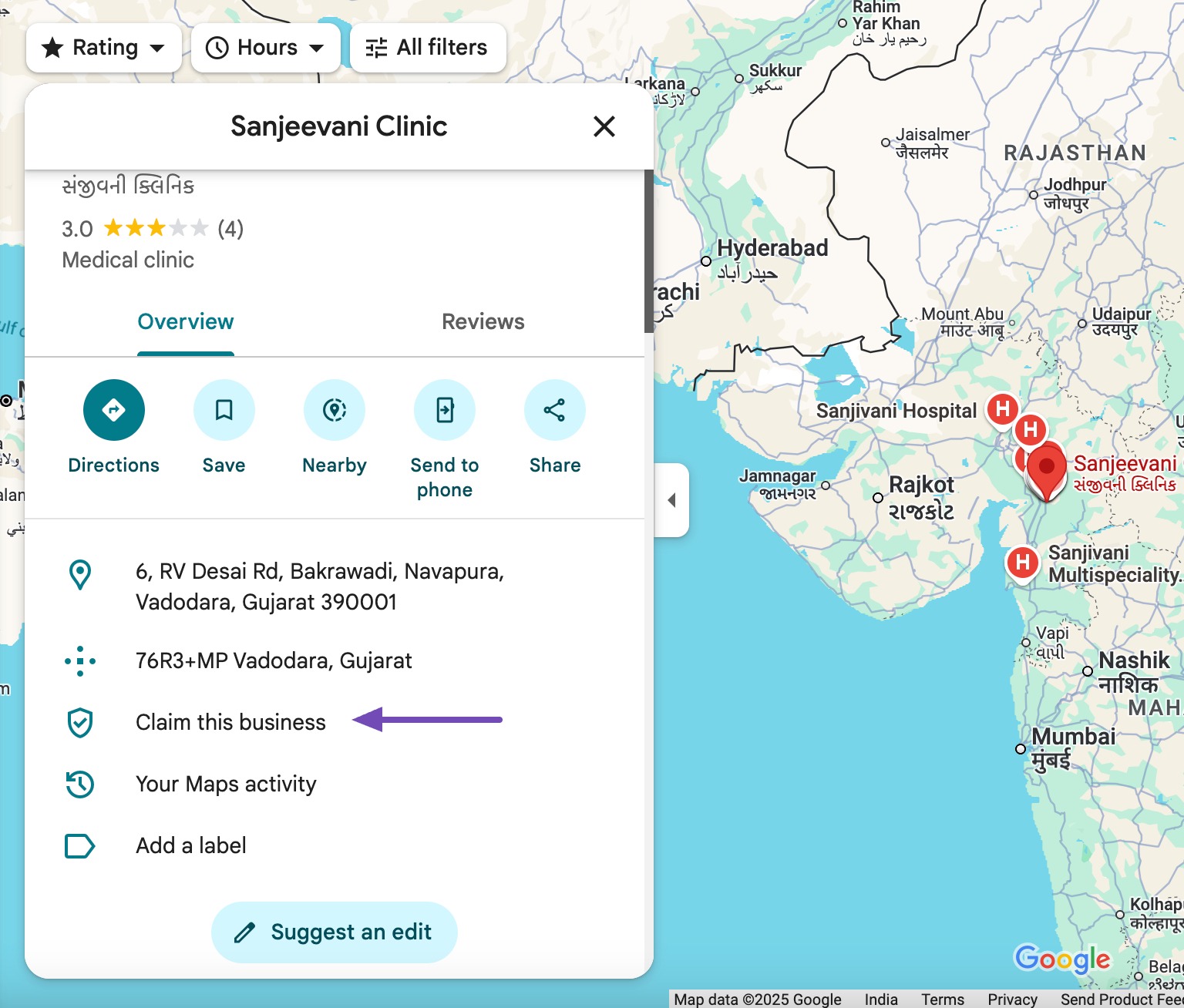
Make sure to fill out every section of your profile, including:
- Your business name and local address
- Opening hours
- Website and contact details
- Photos and videos of your business
- Common questions and answers
- And most importantly, ask happy customers to leave reviews
A well-optimized profile helps you stand out from competitors and appear more often in local search results.
Refer to our dedicated tutorial on Google Business Profile to list your business.
4.2 Use Local Schema Markup
Your Google Business Profile is only one part of the equation. To truly strengthen your local SEO, you need to make sure the same information is reflected on your website, and that’s where local Schema markup comes in.
Schema markup is essentially the language search engines use to understand your site and its content. By adding local Schema, you’re giving search engines a reliable way to verify key details like your business name, address, and phone number (NAP). Think of it as a secondary validation that your business is legitimate and active.
If you’re using Rank Math, adding local Schema is easy. Enable the Local SEO module from the Rank Math dashboard.

Navigate to Titles & Meta → Local SEO. Choose whether your website represents a Person or an Organization.
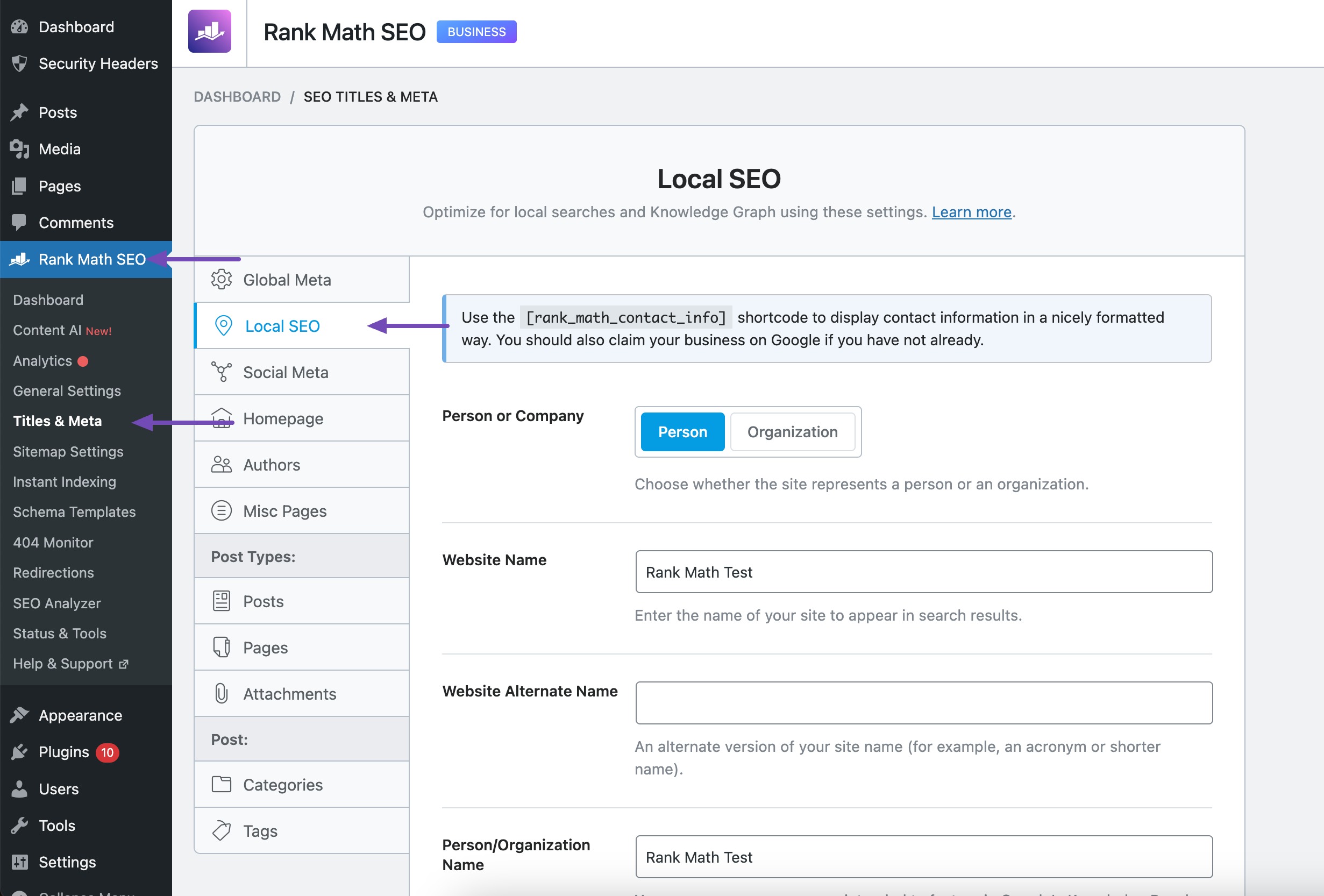
Enter your business details—make sure they match what’s listed on your Google Business Profile and other directories:
- Business/organization name
- Email address
- Local address
- Phone number
- Opening hours
These fields are all available for free in Rank Math, and they’re perfect if your business has one location.
If you run a business with multiple locations, you’ll need Rank Math PRO to unlock features specifically designed for managing and optimizing multiple listings. Scroll down to find the Use Multiple Locations option. Enable this field to ensure seamless functionality of the Google map on your website.

4.3 Get Listed With the Data Aggregators
Data aggregators are major services that collect business information and distribute it to a vast network of directories, search engines, mobile apps, and mapping services. Examples include Neustar Localeze, Foursquare, Express Update, and Factual.
By listing your business with data aggregators, you:
- Save a ton of time by avoiding the need to submit info to each site individually
- Ensure consistent NAP data across the web, which search engines love
- Boost your local SEO by building trust and credibility with Google
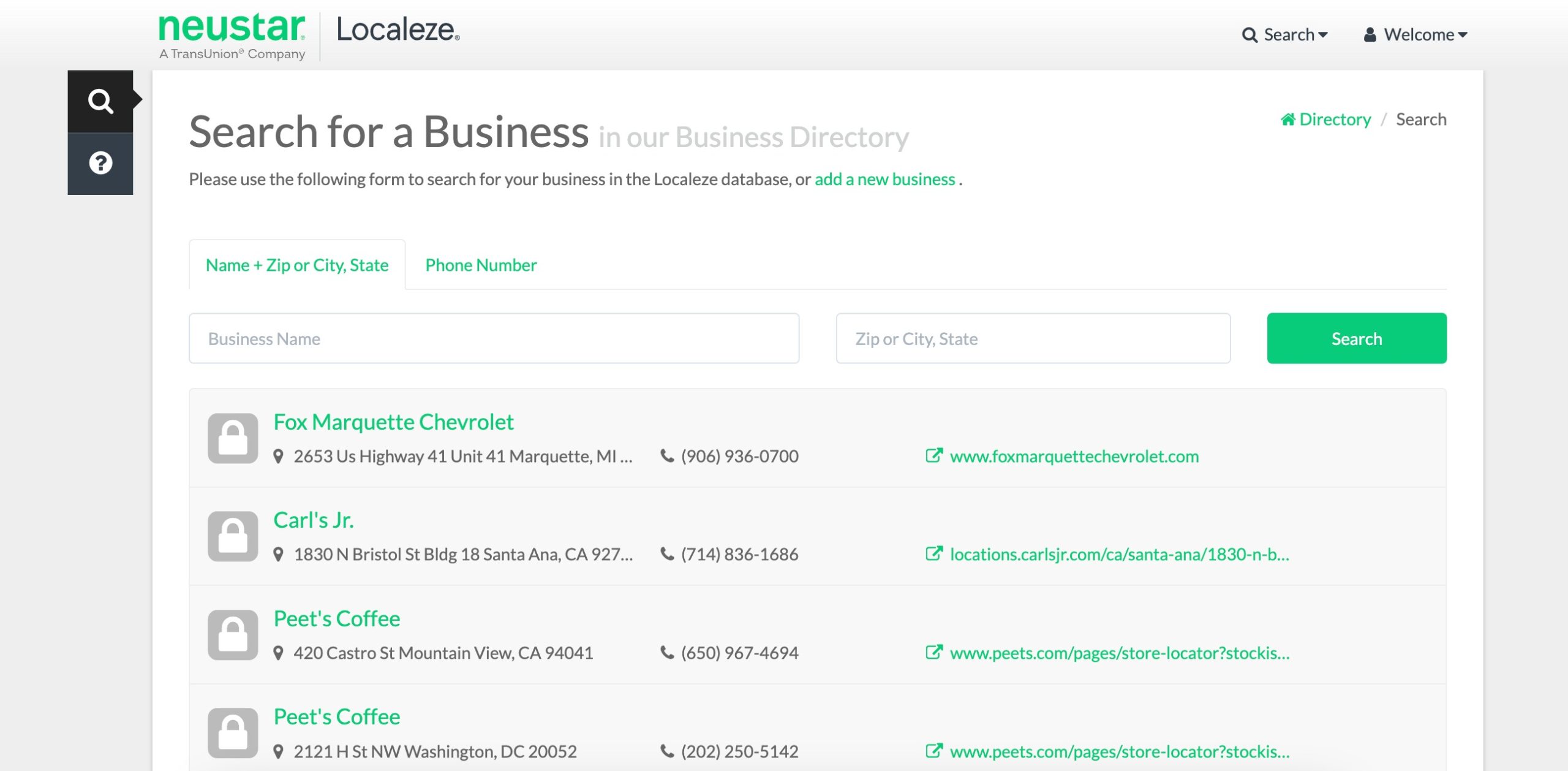
For instance, let’s say your address or phone number changes. Instead of updating every listing manually, you just update it once with the aggregator, and they’ll push the new info everywhere automatically. That means less hassle for you and fewer chances of outdated or conflicting listings.
As Glenn Gabe pointed out in the tweet below, incorrect data or duplicate listings can harm your SEO, which is why working with reliable aggregators is important.
That’s why using reliable data aggregators is so important, they help you stay clean, consistent, and visible in local search.
4.4 Submit to Other Core Sites
In addition to using data aggregators, you should also submit your business information directly to major online directories, commonly known as core citation sites.
These platforms are trusted by both users and search engines, and include sites like Yelp, Bing Places, Facebook, Apple Maps, and Yellow Pages. Being listed on these well-known sites boosts your visibility and ensures potential customers can find accurate, consistent information about your business.
If you’re unsure where to start, check out this list of top citation sources for the US and this one for international directories.
To discover even more opportunities, consider using the Link Intersect tool by Ahrefs. Simply enter the URLs of a few competitors, and the tool will display sites that link to or mention them. These sites are great prospects for your own citation building since they’re already relevant to your niche.
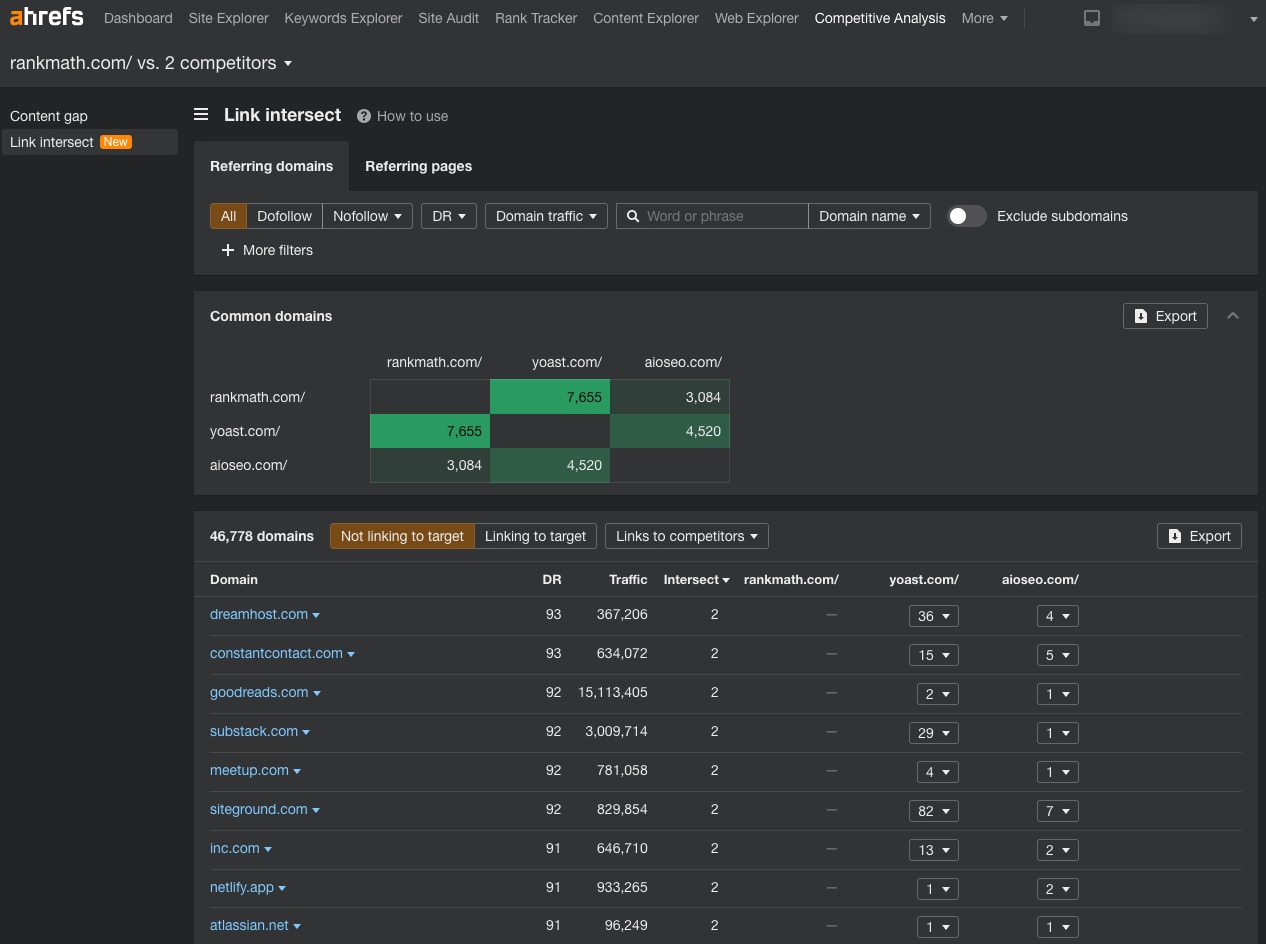
Once you’ve identified relevant platforms, start by claiming or creating your business profiles. Be sure to include key details such as:
- Services offered
- Business name
- Address
- Phone number (NAP)
- Website URL
- Hours of operation
Maintaining consistency across all your listings is essential. Inconsistent details can confuse search engines and harm your local SEO performance.
Many of these directories also let you enhance your listing with features like photos, customer reviews, and special offers. Taking advantage of these options not only makes your profile more appealing but can also improve engagement and local ranking.
4.5 Submit to Niche or Industry-Specific Local Directories
Beyond the major platforms like Google Business Profile, Bing Places, Apple Maps, Yelp, and Yellow Pages, it’s also important to get listed on niche or industry-specific local directories. These directories can help you reach customers who are actively searching for services in your niche.
If you’re a Rank Math user, you can use RankBot, our AI-powered SEO assistant, to help you find the right directories for your industry and location.
To do so, navigate to the Content AI module. Open the Chat tab.

Ask a question like: I’m an aircon servicing company in Singapore. Besides the major listings like Google Business Profile, Bing Places, Apple Maps, Yelp, and Yellow Pages, what niche or industry-specific local directories should I consider?
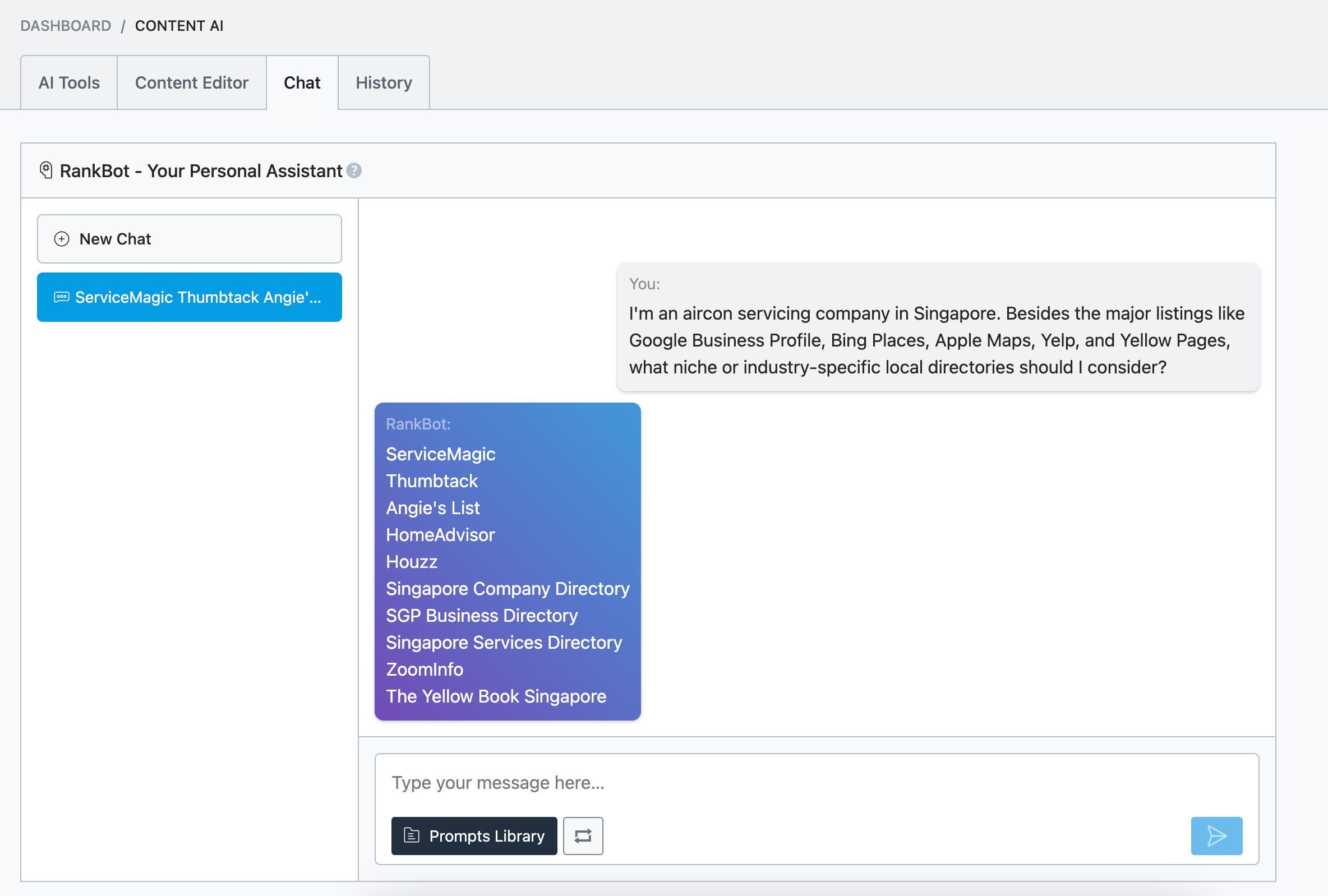
Give it a moment, and RankBot will generate a list of relevant citation opportunities aligned to your business type and location.
These suggestions are based on actual SEO data, so they’re a great starting point for expanding your local presence.
4.6 Utilize Competitor Citation Analysis
If you have access to tools like Ahrefs or Semrush (paid versions), you can easily uncover citation opportunities by analyzing where your competitors are listed.
But even if you’re on a budget, the free version of Semrush can still offer valuable insights.
To do so, sign up for a free Semrush account. Navigate to the Local Dashboard. Enter a competitor’s business name. For instance, if you run a dental clinic, you can enter Q & M Dental Surgery Singapore. Select the business from the suggestions and give it a few seconds to load.
Once the data loads, you’ll see a summary of their local online presence.
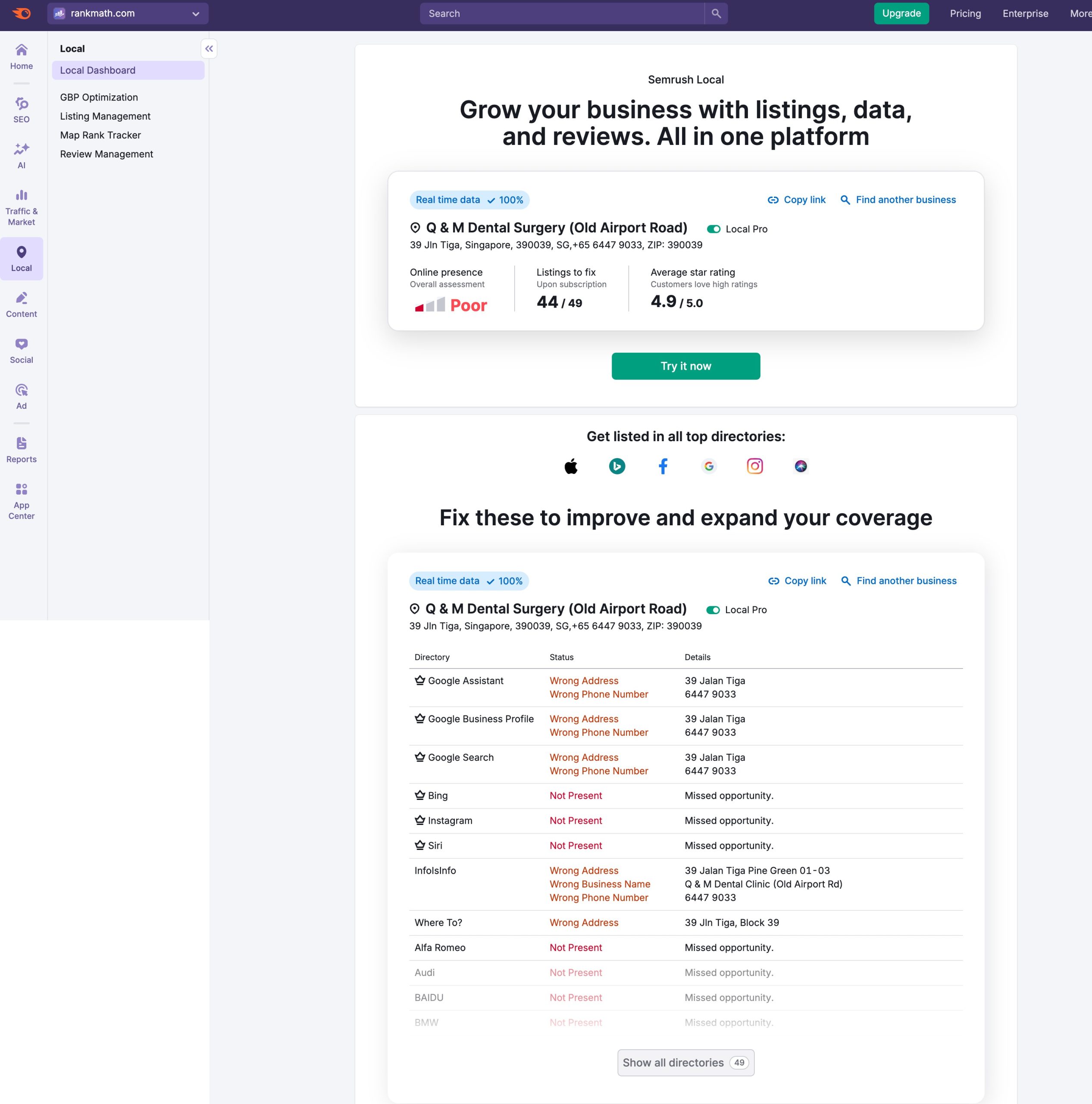
Scroll down to explore the list of directories where they’re currently listed. These often include common platforms like Google Business Profile, Bing Places, Yelp, and Apple Maps, but you might also find niche directories.
4.7 Get Mentioned on Local Websites
Another great way to boost your local SEO is by getting your business mentioned on local websites—even if they don’t link directly to your site. Google considers brand mentions (also called “implied links”) as a trust signal, especially when they come from local, credible sources.
These mentions can improve your visibility in local search results by emphasizing your location and industry relevance.
What counts as a local website?
- Local news outlets
- Community blogs
- Chamber of commerce sites
- Local event pages or directories
- Local influencers or review sites
Even if these websites don’t link back to you directly, a mention that includes your business name and location still strengthens your local SEO footprint.
5 Best Practices for Managing Local Citations
Building local citations is just the start; managing them properly is key to maintaining trust with search engines and staying visible in local search results. Here are the best practices to follow:
- Ensure NAP consistency across all listings
- Monitor and update citations regularly
- Encourage customers to leave a review
- Monitor for duplicate listings
6 Conclusion
Building local citations is one of the most effective ways to improve your local SEO and boost your business’s visibility online. When your business details, like your name, address, and phone number, are consistently listed across directories, niche websites, and local platforms, it sends a strong trust signal to both search engines and potential customers.
This consistency helps you rank higher in local search results, builds credibility, and secures your reputation in your community.
Over time, well-managed citations can lead to more traffic to your website, better conversion rates, and increased customer trust.
As you continue working on your local SEO strategy, remember this: consistent, accurate citations are the foundation of a strong local presence. Make them a priority, and you’ll set your business up for long-term local success.
If you like this post, let us know by Tweeting @rankmathseo.
